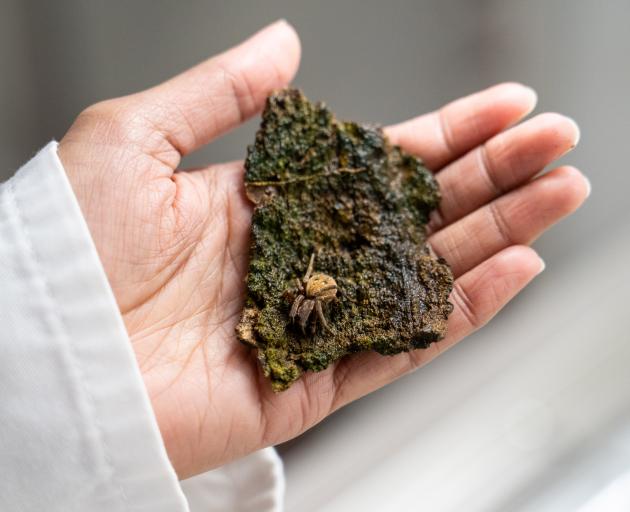Science
Parasitic Worms Transform Spiders into “Zombies” in New Zealand

A surprising phenomenon is unfolding in New Zealand as parasitic worms known as mermithids are turning spiders into what researchers describe as “zombies.” Usha Mendis, a PhD student at Lincoln University, is dedicated to unraveling the complexities of these parasitic nematodes and their profound impact on local ecosystems.
Mendis’s research highlights the alarming effects these worms have on various invertebrates, including caddisflies, mayflies, and grasshoppers, alongside large endemic spiders. She has identified three different spider species currently carrying the parasites, raising concerns about the implications for New Zealand’s biodiversity. “New Zealand has a large number of endemic spiders; over 90% of them are unique to this region,” Mendis stated. “If something were to happen to them, it would not be good for our biodiversity.”
Understanding the role of spiders in the ecosystem is crucial, as they serve as significant contributors to the food web. The presence of mermithids disrupts this balance by altering the spiders’ behavior and physiology. As Mendis explains, “When the worms take over, it flips that idea on its head. The parasite completely changes it; the spiders aren’t filling their normal role.”
The transformation process is both gradual and gruesome, ultimately leading to the spider’s death. Infected spiders often exhibit physical changes, such as enlarged limbs and swollen abdomens, giving them a “zombie-like” appearance. “They can be very abnormal. Their legs get shorter but thicker, and the abdomen gets bigger and swollen too,” Mendis described. Unfortunately, determining whether a spider is infected is challenging. The most definitive sign occurs only after the spider dies, allowing the nematode to emerge and continue its life cycle.
Mendis is investigating how these nematodes infiltrate their hosts, as current knowledge only explains how they exit. The lifecycle of mermithids necessitates a host, and they draw energy and nutrients from the spiders. Mendis elaborated, “They can’t live without a host. They consume the energy and nutrients of the host and grow inside it.”
A key factor in the nematodes’ lifecycle is their need for moisture. The parasites drive spiders toward wet environments, where they can thrive, mate, and reproduce. Consequently, many infected spiders are found drowned in water traps set by Mendis as part of her research. “In that moist environment they can grow, mate and lay eggs. Then those eggs hatch and the cycle begins again,” she explained.
Despite the recent discovery of mermithids in New Zealand, having been reported only 35 years ago, much remains to be learned about their interaction with local spider populations. Mendis emphasizes the necessity of re-evaluating perceptions of spiders, given their essential role in the ecosystem. “Spiders may look disruptive and creepy, but they’re not the enemy. They’ve got their own problems to deal with,” she said.
As research progresses, Mendis’s work will contribute to a deeper understanding of the ecological dynamics at play, underscoring the importance of protecting biodiversity in New Zealand and beyond.
-

 World4 months ago
World4 months agoTest Your Knowledge: Take the Herald’s Afternoon Quiz Today
-

 Sports4 months ago
Sports4 months agoPM Faces Backlash from Fans During Netball Trophy Ceremony
-

 Lifestyle4 months ago
Lifestyle4 months agoDunedin Designers Win Top Award at Hokonui Fashion Event
-

 Entertainment4 months ago
Entertainment4 months agoExperience the Excitement of ‘Chief of War’ in Oʻahu
-

 Sports4 months ago
Sports4 months agoLiam Lawson Launches New Era for Racing Bulls with Strong Start
-

 World5 months ago
World5 months agoCoalition Forms to Preserve Māori Wards in Hawke’s Bay
-

 Health4 months ago
Health4 months agoWalking Faster Offers Major Health Benefits for Older Adults
-

 Lifestyle4 months ago
Lifestyle4 months agoDisney Fan Reveals Dress Code Tips for Park Visitors
-

 Politics4 months ago
Politics4 months agoScots Rally with Humor and Music to Protest Trump’s Visit
-

 Top Stories5 months ago
Top Stories5 months agoUK and India Finalize Trade Deal to Boost Economic Ties
-

 Health2 months ago
Health2 months agoRadio Host Jay-Jay Feeney’s Partner Secures Visa to Stay in NZ
-

 World5 months ago
World5 months agoHuntly Begins Water Pipe Flushing to Resolve Brown Water Issue









